There’s the milking, of course: the 7 a.m. wake up call of uncomfortable cows.
They sell their milk to HP Hood, a national distribution company that pasteurizes and distributes milk. They also sell raw milk off the farm to a loyal customer base coming from as far away as Rochester, New Hampshire, and Boston, Massachusetts. The farm store is also where they make ice cream several times a week. Lynda, Jill (Pat’s wife), and Cindi (Mike’s wife) come home in the evenings from working off the farm to help keep ice cream orders filled. Chris and Jen raise chickens that supply the eggs that are in high demand. Pat and Jill raise pigs and Hereford-cross cows. They sell the beef from their cattle in the store. There’s a tin in the refrigerator to leave the money—all on the honor system. These are things you’d expect from a dairy farm, but there’s more.
They hay the fields of their neighbors. They convert tons of manure to compost and distribute it to local gardens. On the other side of the land, Marty runs a hunting lodge and breeds pheasants, rabbits, and quail to stock the land. He and Mike have at least a dozen Bassett hounds and several rehabilitated falcons all in training. Jen runs her own carding mill, spinning yarn from the wool of neighbors’ sheep. Lynda, Jen, Cindi, and Jill make pheasant pies, ice cream sandwiches, ice cream pops, sundaes, plus wool mittens, sweaters, and hats, to sell at the store.
Just when you think you would drop from the exhaustion, Pat jumps in with tales of the ski hill on their property and their work as groomers on the local mountain during the winter. Chris drives an oil truck. Mike is the fire chief. Pat is a volunteer fireman. They sit on all sorts of planning boards, determined to keep a handle on development and to advocate for their neighbors.
The farm has even won several awards, most recently as a finalist for the Green Pastures Award, which recognizes New England farms for their innovative environmental measures.
Some things remain the same for the Connolly brothers.
“Survival takes roots,” Marty Connolly remarks as he surveys his sons with a mixture of awe and pride, amazed that they have chosen this life to keep the family farm surviving. The fact of the matter is that they couldn’t do it without each other. They each speak with deep gratitude for their wives; for what they have sacrificed and for the radical adjustments they have made to live and work together.
22 : o u t s t a n d i n g yo u t h
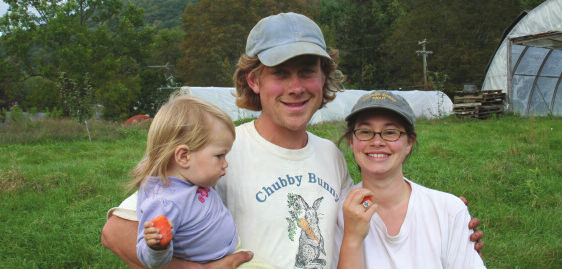
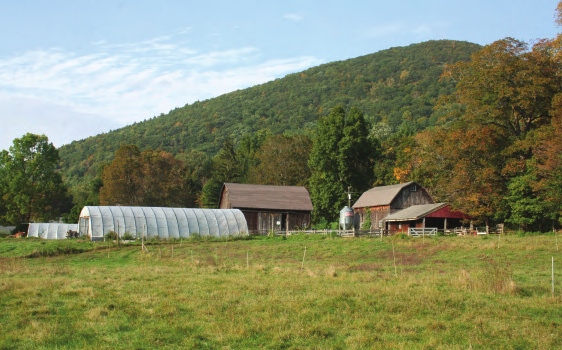
The Noisy Little Farmer
The Hayhursts take a lighthearted approach to their heavy work.
Dan found it much less hilarious when he raised more than twenty rabbits for meat and they escaped into his vegetable fields. His vegetables became a veritable Mr.
McGregor’s garden for the many Peter Rabbits ravaging his crops. Dan and his wife, Tracy, stopped raising them because of the trouble they caused. Dan also felt uncomfortable slaughtering such an abundance of cute, small rabbits—just after tending vegetables—
and decided to raise a few larger, better-behaved animals.
Now the most mischievous character at Chubby Bunny Farm is no doubt Beatrice connecticut : dan & tracy hayhurst
“Butters” Hayhurst, Tracy and Dan’s young daughter, whose passions include The Noisy Little Farmer book and ransacking their small and comfortable post and beam home. Their home abounds with fresh produce and jars of pickled or diced vegetables to last through a cold New England winter.
“It’s sort of a joke. I guess it’s a game where
The Hayhursts dwell in a sheltered valley in Northwestern Connecticut, bordering you put marshmallows in your mouth, and if
on verdant wilderness preserves and removed from the hustle and bustle of the nearby you say chubby bunny with the most
metropolises. Big forested hills loom on all sides of the farm, sheltering it from the worst amount of marshmallows in your mouth,
conditions and making for a spectacular blaze of colors each fall. Narrow country roads you win. I thought that was hilarious.”
wind through the dense woods around the farm, occasionally opening up into the small farmsteads and homes of their few neighbors. Despite their rural location, Tracy and Dan know the big city well. About one half of their Community Supported Agriculture (CSA) clients live in New York City.
In a CSA, customers pay for “shares” in the farm and in return receive a bounty of produce on a weekly basis. The Hayhursts began delivering boxes of vegetables to the Big The name Chubby Bunny Farm conjures up a hearty laugh, but it’s a serious business for master farming Connecticut couple Dan and Tracy Hayhurst. Dan, thirty-two, gets up each morning to practice something like Kung Fu, moving his arms and legs in graceful circular motions, weaving sticks or bricks into graceful patterns to get his blood flowing for the day. With this start he can attack farm work with the paradoxical combination of intense energy and patient gentleness with which all great farmers treat their land. Soft spoken and courteous, Dan smiles as he explains how Chubby Bunny got its name.
“It’s sort of a joke. I guess it’s a game where you put marshmallows in your mouth, and if you say chubby bunny with the most amount of marshmallows in your mouth, you win. I thought that was hilarious,” he says.
24 : o u t s t a n d i n g yo u t h
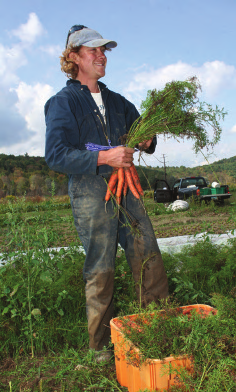
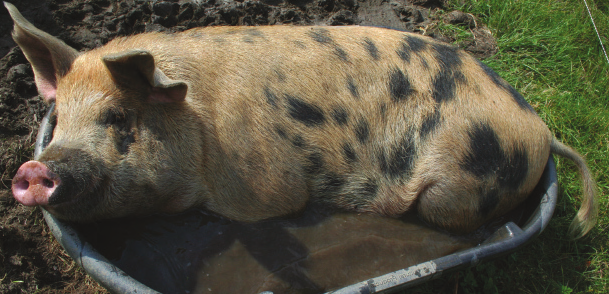
Apple from land they were leasing in Stuyvesant, New York, in 2002. As this part of their business grew, Dan and Tracy became tired of the three hour drive to and from the city every week. Now that they live in a hilly rural area near their respective families where they grew up, Dan and Tracy arrange for the New Yorkers to send a truck to the farm once a week. Customers distribute the CSA goods themselves. Dan and Tracy focus more on their local community, finding nearby CSA members
among former teachers, principals, and old high school friends.
When Dan needed some help on the farm one May, his older
brother, Chris, volunteered. Chris writes on environmental issues and covers various adventure sports as a freelance journalist and rock climber.
By the end of the summer, Chris grew to love working with his hands in the soil and cracking jokes beside his little brother. He often biked twenty-two miles each way, in addition to laboring all day on the farm.
Chubby Bunny regularly hosts farm apprentices. The apprentices
appreciate Dan’s eagerness not just to work hard, but also to impart his intimate knowledge of farming gleaned from internships, farm jobs, and countless hours in the fields.
The Hayhurst family grows more vegetables than they need
trailer that Tracy and Dan lived in for several summers on other farms. Now lined with for their CSA members, so they participate in a local farmers’ market in straw, laying boxes, and proud, protective hens, the trailer is towed to a new spot every Sheffield to sell the excess produce. They also have a little farm store couple of days, allowing the chickens to forage on fresh grass. The Hayhursts also raise in the barn where locals and CSA members come to pick up their
several sheep for meat, and two big, happy hogs dominate a large grass pasture. Beatrice weekly produce.
squeals with excitement as one of the porkers squeezes himself into a muddy black water When customers arrive in the dark cool barn—built ages earlier
bin, grunting and snorting in this watery throne like royalty entertaining guests.
by competent Swedish hands—they can purchase a variety of local
The Hayhursts also raise several sheep for
Chubby Bunny’s customers appreciate Dan and Tracy’s “Farmer’s Pledge.”They products: homemade yogurt, organic salad dressing, pasture-raised beef.
meat, and two big, happy hogs dominate a
promise to adhere to strict organic standards without becoming certified organic. Dan The Hayhursts love to carry other local products, as do their neighbors—
large grass pasture. Beatrice squeals with
swears off artificial pesticides, insecticides, and herbicides. Official certification demands marketing each other’s goods at their respective farm stores. With excitement as one of the porkers squeezes
that farmers document all of their farming decisions. For someone growing more than everything from maple syrup and fresh yogurt to old-style German sauerkraut coming himself into the muddy black water bin,
sixty different crops and engaging in an ingenious milieu of cover cropping, crop rotation, from nearby producers, Dan and Tracy hardly need to go grocery shopping.
grunting and snorting in this watery throne
grazing, weeding, harvesting, and marketing, there is not a lot of time for paperwork. The Back in New York, Tracy ran the farm alongside Dan, but soon decided to follow like royalty entertaining guests.
Hayhursts know their customers, and their customers trust them. While organic her passion for baking. She began making cakes, pies, and cookies for the CSA members certification can create better prices for farmers who sell crops wholesale, for now, Dan and for caterers. One year, Tracy offered dessert shares to the CSA members. Each week, and Tracy create the same healthy organic produce for their share owners without the members could choose between two sumptuous, hand-baked desserts. Mouthwatering as need for certification.
this endeavor was, it was an enormous amount of work, and the Hayhursts are back to the As fall approaches, the Hayhursts can look out over a good harvest and the basics and expanding their local customer base. And now that Beatrice has a couple years imminent arrival of some delicious organic, free-range bacon and sausage. Dan will do odd under her belt, Tracy devotes less time to farming in order to pay full attention to this jobs over the winter and Tracy—better with all things mathematical and official—will newest little farmer.
work on the farm’s website, their taxes, and CSA membership renewals. Beatrice will In diversity lies strength and stability. Dan and Tracy grow nearly sixty different continue clamoring for airplane spoonfuls of homegrown butternut squash and more types of vegetables throughout the year, ranging from staples like tomatoes and carrots to readings of The Noisy Little Farmer.
the more obscure celeriac and kohlrabi. Several dozen laying hens inhabit the same old 26 : o u t s t a n d i n g yo u t h
u n c o m m o n w i s d o m : 27
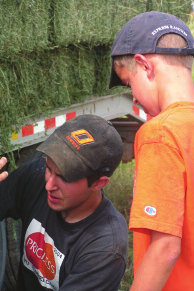
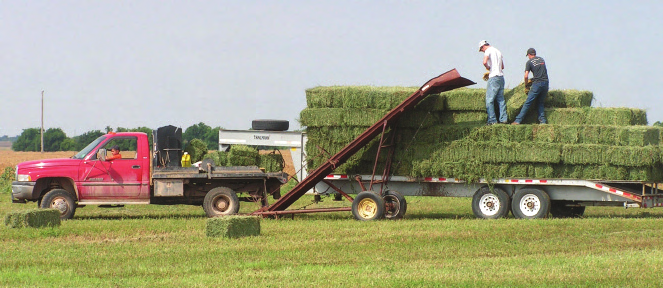
Hay Bales & Five Generations
how he was going to spend his life. Politics and public speaking were high on the list, but they didn’t stick.
“I was so unsure about what I wanted to do, but when I came home on the weekends, there was always this excitement because I got to do what I loved and be in a place that I loved,” he says.
The passion Travis has for working on the farm cannot be matched. His freshman year he made a conscious decision to return to Garber after graduating and join his family’s farm. To stimulate economic development, he also plans to start an oklahoma : travis schnaithman
agricultural manufacturing or marketing business in Garber.
Travis says with a grin,“I realize farming is not a common career path for my generation.” Many people react with surprise when they hear his plans.
As a Dodge truck bearing Oklahoma red dirt and an “Eat Beef” license plate He recalls a conversation he recently had with an older farmer. The man asked creeps between square hay bales, its passengers bustle with silent energy.
him about his future plans. When Travis said he wanted to farm, the man shook his head Behind the wheel, a youngster takes the form of a veteran farmer. His older
“I was so unsure about what I wanted to do,
and replied,“It’s a tough way to make a living.”
brother scrambles across the hay towed directly behind the truck. He grins, wiping but when I came home on the weekends,
“It’s been a livelihood for generations before, and I don’t want to be the the sweat off his brow as the stack of hay on which he rides grows steadily bigger.
there was always this excitement because I
generation to let it slip,” Travis replied.
In his eyes glows an intense pride. In his heart grows the hope of his grandfather. In got to do what I loved and be in a place
As he gazes across the farmland before him,Travis pauses and says slowly,“The his being is the making of his family’s next great generation.
that I loved.”
land and the heritage mean a lot to me. It’s something that just kind of gets stuck in For this young man, twenty-year-old Travis Schnaithman, there is little your blood. There’s been a lot of sweat and tears gone into holding onto this land.”
question about spending the rest of his life on the farm. The Oklahoma State Travis, Tyler, and their sister, Carly, were raised in the house that was built on the University agribusiness major has lived his entire life on his family’s centennial farm, farm when their father, Lee, was five years old. Though Lee and his wife, Becky, live and six miles from the rural town of Garber, Oklahoma.
work on the farm, Lee was the first generation to not farm full time.
The farm, Travis says, was homesteaded in 1893 by his great-great Travis says his father had to pursue another career because farming had grandfather, John Jacob Schnaithman. John participated in an Oklahoma land run become less economically viable. While his father worked, Travis spent his childhood after immigrating to the U.S. at sixteen years of age. Five generations have been hiking around the farm with Myron Schnaithman, his late grandfather. Surely, it was raised here since.
hands-on experience that ignited his passion for the work.
Abruptly turning his attention back to the hay bales, Travis lets out a laugh
“I was really fortunate to be
as younger brother, Tyler, jolts the truck to a stop announcing that it’s break time.
around my grandpa for so long and learn
Travis, Tyler, and three friends from Garber—persuaded by the
from all that knowledge and wisdom and
Schnaithman brothers into helping haul hay—mosey into a tin barn and perch on experience,” he says.
hay bales. Tyler grabs a small ice chest and unveils Dr. Pepper and Gatorade. One of From his father, though, Travis
the friends—who graduated from Garber High School with Travis in 2005—says it’s gained an enthusiasm for something
good to be back home.
else: the Future Farmers of America (FFA).
“There’s no place like rural Oklahoma,” he says.
Travis was playing in his parents’
Another, sweating, laughs and mentions he can’t remember when he last bedroom as a child, when one day he
did so much physical labor. Travis takes a swig of Dr. Pepper, slaps one friend on the stumbled across a blue jacket with gold
back, and says he loves the work.
writing stitched across the chest. It was
Travis returns from college to his family’s farm every chance he gets. He his father’s high school FFA jacket. Travis
does pretty much everything on the farm, from driving the tractor and cleaning decided he should get one of his own.
out wheat bins, to hauling hay and feeding cattle, to building fences. When he Joining the FFA chapter at
started at Oklahoma State in the fall of 2005, he had other ideas in mind about Garber High School in eighth grade was
28 : o u t s t a n d i n g yo u t h
u n c o m m o n w i s d o m : 29
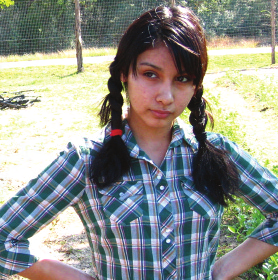
the beginning of a path that would hone and demonstrate his natural aptitude for Herbs and Heritage
agriculture. As an upperclassman, Travis served as president of the Garber FFA. His senior year, he was awarded one of organization’s highest honors: 2005 State Star Farmer. He was also one of 699 FFA members to earn a State FFA Degree that year. Just before graduating, Travis was elected FFA state secretary and during the spring of 2006, he was elected state president. Though he served state-level FFA offices, Travis says his true passion lies is his own community. He has made it his personal mission to serve as an ambassador and advocate for small, rural towns.
Garber, a primarily agricultural community, boasts a population of roughly one texas : noemi alvarez
thousand residents, many of whom—like the Schnaithmans—have been in the area for generations. Travis claims they are the finest people on earth.
“Garber’s a great place to raise a family,” he says.“It’s a place where you don’t
“I actually like weeding,” says Noemi Alvarez, a week
have to worry about your kids playing in the street. I definitely want to call it home shy of fifteen.“And nobody likes weeding. But I don’t like
again some day.”
picking green beans!”
“People two and three generations removed
A growing problem facing towns like Garber, though, is the fact that most Everything coming out of her mouth sounds normal,
take small town heritage and agriculture
young people do not come back. With the youth goes money and jobs, too.
but life is anything but for this young woman.
for granted, and lose a sense of
“It’s really sad,” Travis says.“You go to small rural towns and all of the businesses This will all be very confusing unless we back up a
understanding of what small town-
are closed down. That’s what really hurts our country. People two and three generations couple decades. Noemi’s parents, Sylvia and Miguel, were
generated products do for them.”
removed take small town heritage and agriculture for granted, and lack a sense of teenagers when they came to America from Mexico in the late
understanding of what small town generated products do for them.”
1970s. Sylvia studied teaching in El Paso, and Miguel—well,
According to Travis, the best way to revitalize small towns is to be good Miguel was a tourist, spending a few days in Texas. He was
stewards of the land and to provide a safe and affordable environment that everybody watching some boys playing football, a sport he’d never seen,
can benefit from.
and a few minutes after joining the game, he scored a fifty-five-Citizens of small towns, Travis says, must also make individual efforts to support yard field goal. A scout signed him nearly on the spot, and he
schools and to promote town image. He has tried to do his part, joining the Garber played for the Houston Oilers for a few years before starting a
Citizens in Action. He has helped to fix old buildings, establish a citywide clean-up, and small dump truck business in Austin.
assisted with the community theater.
In 1984, Miguel and Sylvia bought ten acres of land in
“A lot of people in Garber take pride in keeping Garber alive and thriving,” he Lexington, fifty miles east of Austin, where the quiet landscape says.“It’s a good experience to give back to the community. When I get out of college, I of neatly tilled fields is disturbed mostly by clouds of dust
hope to do more of that.”
following pickup trucks. The soil was sandy and their land
As for youth returning to small towns, Travis has hope.
almost entirely wooded.
“History sometimes likes to repeat itself,” he says.“I think that in future
“You can grow watermelons here, some black-eyed peas maybe,” old-timers generations, young people will want to get out of the city so they can better understand told them.“Don’t hold your breath for much beyond that.”
small towns and agriculture.”
Sylvia remembered warm milk from her grandparents’ farm in Zacatecas and The last Dr. Pepper can jangles on the bottom of an empty cooler; break time is homegrown honey. She planted a little garden for the summer: tomatoes, peppers, over. The pickup is revving and Tyler motions for Travis to come. Travis smiles broadly, squash. Surprisingly, they grew. The Alvarezes have managed to coax an amazing wipes his hands on the knees of his jeans, and gets back to work.
abundance of produce out of the sandy soil.
Noemi is the youngest of Sylvia and Miguel’s three children. She was born on the farm and has helped with the family enterprise for as long as she can remember.
Lucky for her, nothing about the Alvarez’s farm gets boring.
Each year the view out the kitchen window changes. This is a trial-and-error 30 : o u t s t a n d i n g yo u t h
u n c o m m o n w i s d o m : 31
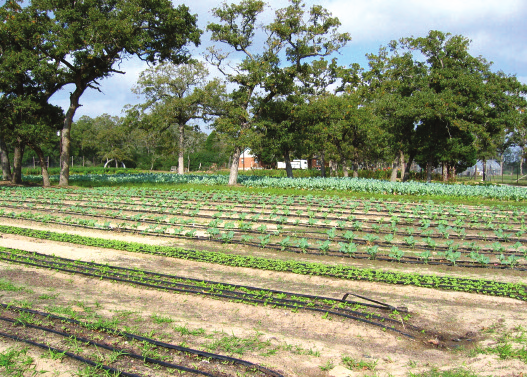
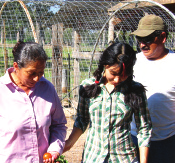
family. They milked goats for a while; they raised cattle; they had a few hives of bees for Miguel Jr. now attends college in Austin, but when he’s at
mesquite honey and to pollinate the squash. They tried raising broiler chickens, then home he splits wood, kills chickens to sell, and helps with everything switched to quail and turkey. Last year they grew grapes, which they won’t be doing else. Noemi divides her time rather evenly between her schoolwork again. They made strawberry ice cream and brewed tea. Harlequin bugs chomped on (she just finished a project on Christopher Columbus), ballet (this year their arugula leaves; deer wandered in and munched on the broccoli; hawks swooped she’s a bon-bon in a production of The Nutcracker in Austin), and her down and plucked off chickens.“It was beautiful to watch, actually,” says Miguel.“But work on the farm. Besides the ever-present weeding, Noemi helps
then it was like, ’Oh no, my chickens!’”
with harvesting to get ready for two farmers’ markets a week. The With each setback, unfazed, they reviewed their mistakes and corrected them, family has a booth at the Saturday market in downtown Austin and planting “trap crops” like early arugula to distract the harlequin bugs; building taller, one on Wednesdays in front of Whole Foods, an Austin-based
electric fences to keep out the deer; and weaving an elaborate overhead spider’s web of company.
cables, beribboned with red flags, to divert the hawks.
Ninety percent of their harvest is sold at these markets; the
Projects not abandoned? Herbs and heirloom tomatoes, beans, asparagus and rest goes into thirty CSA (Community Supported Agriculture) boxes.
strawberries, raised beds and French biointensive methods, and planting in sync with the
“We’d like to do more CSAs,” says Sylvia, adding that the
biodynamic calendar developed by Rudolf Steiner. The raised beds have been the most family enjoys the personal contacts at the markets, and that new productive. Although they lost almost three-quarters of their 800 free-range chickens to regulations will soon allow vendors to accept WIC vouchers.
the hawks, raccoons, and foxes, they plan to persevere. This year they planted twelve Noemi chimes in, saying “The farmers’ markets are cool. We
thousand strawberry plants, and they’ll be covering a few rows with red rather than know the names of all the regulars, and the kids of some of the other black plastic, just to see what happens. Sylvia is the force behind such experiments.
vendors are my friends.”
“I read a lot,” she volunteers. If Sylvia is the scientist, Noemi is her trusted lab The view out the kitchen window is about to change again.
assistant—a constant companion in the fields and co-conspirator in designing new Enthused by the rising popularity of game birds, Miguel is planning ways to grow food more productively.
to try raising quail again. He’s hoping the income will make up for the It turns out that there is little haphazard in their choices and methods.
loss of income from the large field that will be lying fallow next
“Chemicals destroy the land and deplete the soil,” Sylvia says,“not to mention year—part of the plan to let fields “hibernate” every seven years.
what they do to the human body.”
Miguel has built a clay oven to roast the quail, which he plans to sell Organic farming is more work, she adds, citing their constant battle against at the farmers’ market and at a new farm stand the family hopes to pests and weeds. On the other hand, by using open-pollinated heirloom seeds rather get up and running next summer.
than hybrids, and foregoing chemicals, they avoid costs that conventional farmers incur.
“People will be able to come and pick their own
“I’d love to farm with draft horses,” she sighs,“but Miguel is the one who does strawberries,” Sylvia says. Noemi nods, indicating that she’d welcome the help. Plans all the tilling and plowing, and he likes his tractor better. You pick your battles.”
down the road call for building a commercial kitchen where Sylvia and Noemi can do
“Farming is another way of worshipping God,” Sylvia says, seriously. Then she more canning and preserving. There’s also talk of constructing housing to accommodate
“I always think it’s pretty awesome that
chuckles:“You’re close to the Creation, but you’re on your knees, too!”
their farm workers and perhaps WWOOFers (World Wide Opportunities On Organic from a little seed you can grow a
Noemi’s perspective on farming is simpler, but no less eloquent:“I always think Farms) or interns. Maybe they’ll buy a dairy cow with their neighbors and share the humongous plant.”
it’s pretty awesome that from a little seed you can grow a humongous plant.”
unpasteurized milk. Plans are always percolating.
Because Sylvia has homeschooled Noemi and Miguel Jr., Noemi meets most of Meanwhile, the family is focused on a big event happening in two weeks: her friends through ballet and church. The family is of Sephardic Jewish origin. For Noemi’s quinceañera, her fifteenth birthday—a major Latin American coming of age several years they commuted to the Back to the Land ministries church in Waco, which celebration. For the past six Sundays, she and her friends have been practicing their has a number of Jewish members, but they now attend a Christian church that’s closer.
waltz and salsa moves in preparation for the big day. The young women had long,
“A lot of kids at church want to come to the farm because they think it’s cool satiny dresses made for them in Laredo; the men and boys are getting fitted for their seeing cows, but we don’t have any cows, but whatever,” says Noemi, all run-on tuxedos this weekend.
sentences, bubbly, and insouciant.“The last four rows of broccoli, my friend James from
“We won’t be at the farmers’ market that day,” says Noemi, “but we’ll back the church and I planted; that was fun.”
following Saturday.”
32 : o u t s t a n d i n g yo u t h
u n c o m m o n w i s d o m :












